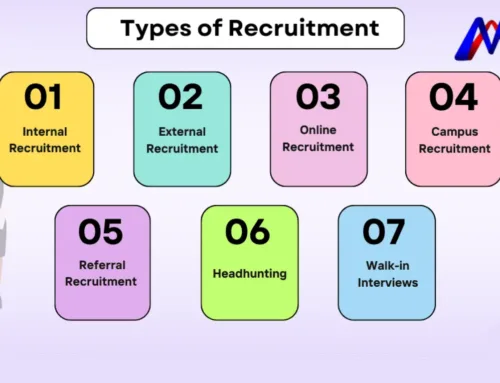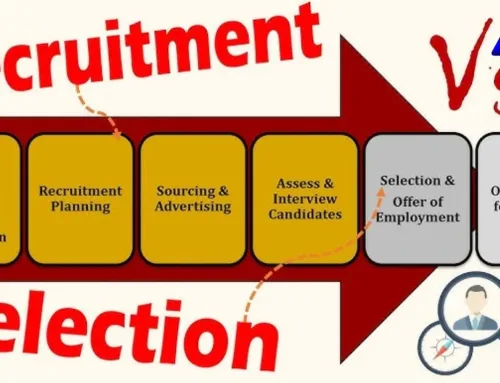Many human resource roles and responsibilities involve some degree of administration, from processing payroll and keeping employee records to creating employee training sessions, conducting performance reviews and assuring compliance with labour laws.
An adequate compensation and benefits program can help companies attract and retain top talent. It can also align employee goals with company objectives and create company advocates.
HR responsibilities
- Recruitment.
- Administration.
- Compensation and benefits.
- Training and development.
- Employee relations and performance management.
- Provide a career path within the organization.
- Offer continuing education opportunities.
- Train and support managers.
- Support health and wellness
Contact Us
Recruitment
HR departments play an essential role in recruiting employees. HR departments identify the individual best qualified for each company position and determine who meets that profile by advertising job vacancies, reviewing applications, conducting interviews and screening references before conducting tests and assessments and training new hires on their roles. The recruitment process may be time-consuming and costly as it involves advertising job vacancies, reviewing applications received, conducting interviews, screening references and administering tests/assessments before selecting and hiring qualified individuals.
HR managers create compelling job descriptions that clearly outline each position’s requirements and accurately represent their roles. They may also devise a systematic selection process designed to ensure efficiency and fairness during hiring processes, posting job openings across media platforms like newspapers, social media sites, career websites or external recruiters; recruiting talent acquisition, software may be utilized by HR to find candidates best suited to fill open positions at their companies.
HR departments sometimes conduct internal recruitment by filling a vacant position with existing employees through promotions, usually to save money on external recruitment costs and show they value employee development and growth. They are also accountable for setting promotion rules such as merit or seniority to ensure fairness for both sides.
Administration
Human resources (HR) staff manage employee records, such as processing payroll and benefits administration paperwork. This ensures compliance with labour laws regarding working hours and ensures employees receive accurate compensation. HR workers also manage computer files and liaise between IT and HR regarding possible troubleshooting issues.
Human resources (HR) departments perform numerous administrative functions that range from administering employee training and evaluating new hires to setting goals and creating programs to assist employee growth (such as mentoring or networking groups). HR also plays a significant role in creating an enjoyable work culture – one of their main focuses.
Other administrative responsibilities for HR professionals include developing, maintaining and updating employment policies that comply with local, state and federal regulations for hiring, firing and compensation practices. This may involve setting or amending hiring/firing and compensation rules accordingly.
Examples of HR functions include revising smoking policies to comply with health and safety requirements. Furthermore, HR may need to ensure compliance with labour laws regarding minimum wage and overtime pay and implement and manage company policies such as grievance procedures. Since the #metoo movement emerged, HR has played an essential role in handling sensitive matters; HR must recognize issues early and make fast decisions that prevent problems from becoming full-blown.
Compensation and Benefits
Human Resources professionals have the responsibility of ensuring their employees are adequately compensated. This involves setting salaries, bonuses and fringe benefits such as health insurance, vacation days and retirement contributions by competitor compensation practices and setting compensation levels by those standards.
HR managers monitor workplace changes, adapt policy accordingly, and update when needed. Furthermore, HR also disseminates these policies so all employees know them; examples include work-from-home rules, travel policies, and dress code guidelines.
Payroll administration is another aspect of HR that demands significant time and focus. Deductions such as taxes, allowances and reimbursements must be processed every pay period to maintain accuracy; there are software tools that can automate some aspects of this process to free up HR teams for other duties.
Hiring from within is an integral business component, and HR must implement policies to facilitate it. They must also provide feedback and coaching when required – this may include performance appraisals for employees with negative attitudes toward them. HR is responsible for creating an appropriate procedure that produces constructive criticism and growth opportunities – which is especially important in large workforces.
Training and Development
Human Resources plays an integral part in ensuring employee training. This could take the form of workshops, seminars or one-on-one coaching, its purpose being to ensure all employees possess the skills necessary to meet company and customer expectations. Trained employees typically make fewer errors, which saves both time and money; additionally, they know how best to use materials and equipment, which leads to less waste or breakage expenses.
Training managers to be influential leaders is another aspect of this function. It may involve coaching or counselling as a form of instruction, which can assist managers with conflict within their team and deal with it more efficiently. Formal performance appraisals may also serve the purpose of improving employee performance. Despite criticism against formal assessments, these can still be valuable tools for increasing performance levels within employees’ workforces.
HR managers are responsible for analyzing and reviewing employee compensation and benefits packages. This may involve conducting market analyses to compare salaries and benefits between competing companies or changing benefits such as retirement plans.
Human Resources plays an essential role in creating an inviting company culture. This may involve employee recognition programs, informing staff about new opportunities within the company and offering career paths for advancement. HR’s efforts can help a company retain key employees and customers and boost morale and employee satisfaction levels within an organization.
Employee Relations
Employee relations refers to interactions between an employer and its employees, such as resolving workplace conflicts, conducting training sessions, coaching employees on tasks they need help with, providing counselling support as necessary and offering coaching/counselling for managers/employees as required.
Employee relations exist to create an enjoyable work environment that fosters teamwork and cooperation among employees while giving them access to tools they need for success, such as clear policies and procedures.
If a problem arises in the workplace, such as with coworkers or complaints against the company, an employee relations specialist can help find solutions by identifying its source and suggesting appropriate action. They may also assist with legal compliance issues like discrimination and harassment investigations and provide training or consultation about workplace topics.
HR teams must foster relationships between their employees and HR and stay aware of and quickly react to trends affecting employee well-being. This could include monitoring job satisfaction levels or absenteeism/turnover rates – staying abreast of these trends is vital to ensuring your team has access to resources necessary for its success at work.
Performance Management
Human resource (HR) managers are pivotal in equipping employees with the tools to succeed, including training programs and personal development opportunities such as leadership degrees or professional certifications. HR also ensures that employees have clear career pathways and ongoing education opportunities within the organization.
Effective performance management is another core role of HR teams. Here, the goal is to ensure that all employees receive honest and open feedback and are working toward reaching organizational goals. This can be accomplished using tools such as Kudos (an employee recognition platform) or, more conventionally, via one-on-one sessions between managers and direct reports.
Other tools used to improve performance management include internal ranking functions by subject matter experts who evaluate each part’s value to the organization. Furthermore, 360-degree feedback provides employees with feedback from their peers and managers, allowing them to identify gaps in communication with managers that can then be addressed through coaching or mentoring programs. Finally, HR teams create procedures that facilitate internal promotions based on merit or seniority.
Provide a career path within the organization
HR is responsible for various workforce-related procedures, such as recruiting, compensation and mediating disputes. While these duties may seem mundane, they’re critical in keeping employees satisfied and motivated to produce their best work. Below are other roles that contribute to maintaining an HR department running efficiently:
Career pathing is a vital function that HR professionals should be able to fulfil. Clear career pathways enable growth opportunities while decreasing employee turnover rates; HR can either implement formal processes for this or meet with each person individually to develop a personalized plan.
HR can also offer professional development opportunities for all employees. This might range from customer service classes to leadership development programs; HR will work with managers to make sure these classes fit within employees’ schedules.
HR is also responsible for performance management. While many companies are moving away from annual performance appraisals, performance appraisals remain integral to HR’s role. They foster communication between managers and employees, encourage goal-setting processes, and help enhance overall performance.
HR offers various other forms of feedback, such as 360-degree assessments or one-on-one meetings with supervisors. These assessment forms allow for more in-depth analyses that can pinpoint the root causes of issues.
Offer continuing education opportunities
HR departments typically oversee employee continuing education programs, such as professional development courses and employee tuition resources. Such initiatives provide significant incentives to remain with an employer while helping employees advance in their careers.
Emeritus India provides high-impact HR courses and certifications and career-oriented online courses designed to equip HR workers with human resources management, employee relations management, organizational development training and legal issues. If these areas interest you, check out what we offer now or contact us to register and register!
Train and support managers
Human resources managers (HR managers) are accountable for equipping their direct reports with the skills and tools necessary for success, such as effective onboarding, training programs, performance reviews and discipline issues when necessary. HR managers often collaborate with other teams to ensure smooth operations within departments.
Communication is another vital element of HR managers’ jobs. This involves sharing company updates with employees and making sure they have access to any pertinent information affecting them, such as policy changes, new benefits or training programs that may impact them directly. HR managers must communicate in straightforward ways for employees to comprehend.
Human Resources (HR) departments are charged with overseeing performance appraisals. Although some companies are moving away from annual evaluations, this process remains essential for HR departments to perform as it helps provide feedback on employee performance while encouraging continuous feedback channels and helping identify training needs.
The HR team also must establish rules regarding promotions within the company, with preference given to merit and seniority-based practices that help retain top talent while supporting the development of young employees. However, for this to work effectively and avoid disputes or legal action, it must be strictly adhered to; otherwise, conflicts or lawsuits can arise from the failure of HR procedures.
Also Read:- How to Write a Mail to HR for Job Application
Support health and wellness
HR leaders must help promote employees’ health and wellbeing. They can do this by encouraging employees to prioritize physical and mental wellbeing and offering wellness programs to promote healthier habits and manage stress levels. By creating an environment conducive to health, HR leaders can develop a culture of wellbeing that makes employees happier in their work lives and fosters more engagement at work.
HR can promote mental health by offering employees a safe space to voice their concerns and a range of support services – from confidential hotlines, workshops, and educational materials to flexible work arrangements, adjusted schedules and additional vacation time – in addition to accommodating them for mental health challenges such as flexible working arrangements or extra vacation days. This approach can reduce the stigma of mental health issues while increasing employee productivity and workplace satisfaction.
Human Resources also serves an essential function by disseminating information to employees, including new policies or updates that directly affect them. They conduct employee surveys to gain feedback, identify improvement areas, or make necessary adjustments.
Conclusion
HR can be essential in ensuring the company abides by all relevant laws and regulations, such as keeping track of employee records that comply with labour regulations regarding working hours and conditions. They may also review existing policies as needed to meet the business’s needs.
HR can be an exciting, stimulating career choice with many personal and professional growth opportunities. Influential HR professionals need the ability to work efficiently with people while having all the skills required in their roles, such as active listening and empathy. Furthermore, HR leaders need to maintain professionalism while offering employees an open environment – this can be accomplished through mindfulness practice or being cognizant of any biases within themselves – creating an inclusive work culture that meets everyone’s needs.




